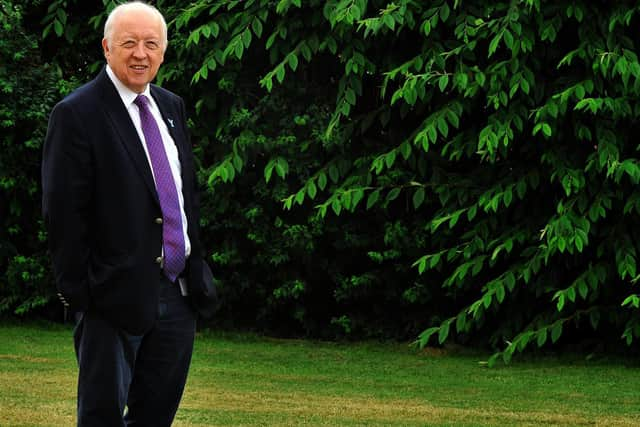North Yorkshire county council leader Carl Les says it will 'more complex and expensive' to keep making progress on its 2030 net-zero target
North Yorkshire County Council's three-year plan to help meet its goal of becoming carbon neutral by as close to 2030 as possible includes a greater use of battery electric vehicles and more investment in solar energy.
The Tory-run authority, which spends £1.8m a year on energy at its offices, libraries and elderly person homes creating 4,547 tonnes of carbon equivalent emissions in 2019, has emphasised that the plan only concentrates on emissions which it has direct control over. The plan gives no indication of emissions from the thousands of school buildings it owns.
Advertisement
Hide AdAdvertisement
Hide Ad

The draft plan, which will be considered by the authority’s executive on Tuesday, highlights work being undertaken and its planned work, some of which it states will need government funding to go forward.
The report states: “There will need to be considerable financial investment to achieve the council’s aspiration to be carbon neutral. Some of this investment, for example in improvements to thermal insulation and heating systems, will save money in the longer term and a number of funding streams are available to support some elements of the required action, such as tree planting, decarbonisation of heating of public sector buildings.
“However, we and other local authorities will not be able to tackle every aspect of carbon reduction nor achieve net carbon neutrality without government support and action through legislation and fiscal measures.”
A report to the executive states the authority has just completed a project to replace its 50,400 street lights with new LED technology, two years ahead of schedule, saving capital costs of over £4m. Energy and maintenance savings of £1.3m are projected for this year and a cut of 3,000 tonnes of carbon emissions.
Advertisement
Hide AdAdvertisement
Hide AdIt adds the council’s carbon-cutting strategy also includes measures, such as potentially developing a solar farm, that may not directly reduce its carbon footprint but would be environmentally beneficial.
Other proposals include continuing work to improve reduction, reuse, recycling and compost of waste. Ten years ago, the authority sent 94 per cent of household waste to landfill but by 2019, 47 per cent of household waste was reused, recycled or composted, nine per cent sent to landfill and the rest sent for treatment.
County Council Leader Carl Les said: “We regularly explore how we might be able to reduce emissions and have a track record of taking opportunities wherever possible, for example in our LED street lighting programme.
"We have made significant progress in recent years, but it’s likely that further work will be more complex and expensive in future.
Advertisement
Hide AdAdvertisement
Hide Ad“This challenge is not unique to the county council. It is the same for every organisation and, indeed, every household in the country. For us, the big challenges remain around transport and the heating of buildings.”
North Yorkshire's 2030 target is more ambitious than most other authorities. West Yorkshire Combined Authority wants to achieve net zero carbon economy by 2038 and Transport for the North's target is for near-zero carbon emissions from surface transport by 2045.
The report acknowledges that the council cannot achieve its goal alone and says there will need to be considerable financial investment to achieve the aspiration.
Some of this, for example in improvements to insulation and heating systems, will save money in the longer term, and funding is available to support some actions, for example tree planting and decarbonisation of heating of public sector buildings.
Advertisement
Hide AdAdvertisement
Hide AdCoun Les said: “Our ambition is for a North Yorkshire that continues to thrive, a county that can emerge strongly from the pandemic and adapt to change while remaining a special place to live, work and visit.
“An important part of this is working in a more sustainable way, reducing emissions and costs. We will do everything we can, but we can’t do it alone. We need to work alongside our partners and take residents and businesses with us, as well as looking to government for support at a national level.
“With my colleagues, I look forward to considering this report as the next step in a journey that we must all travel to achieve the future we want to see.”
